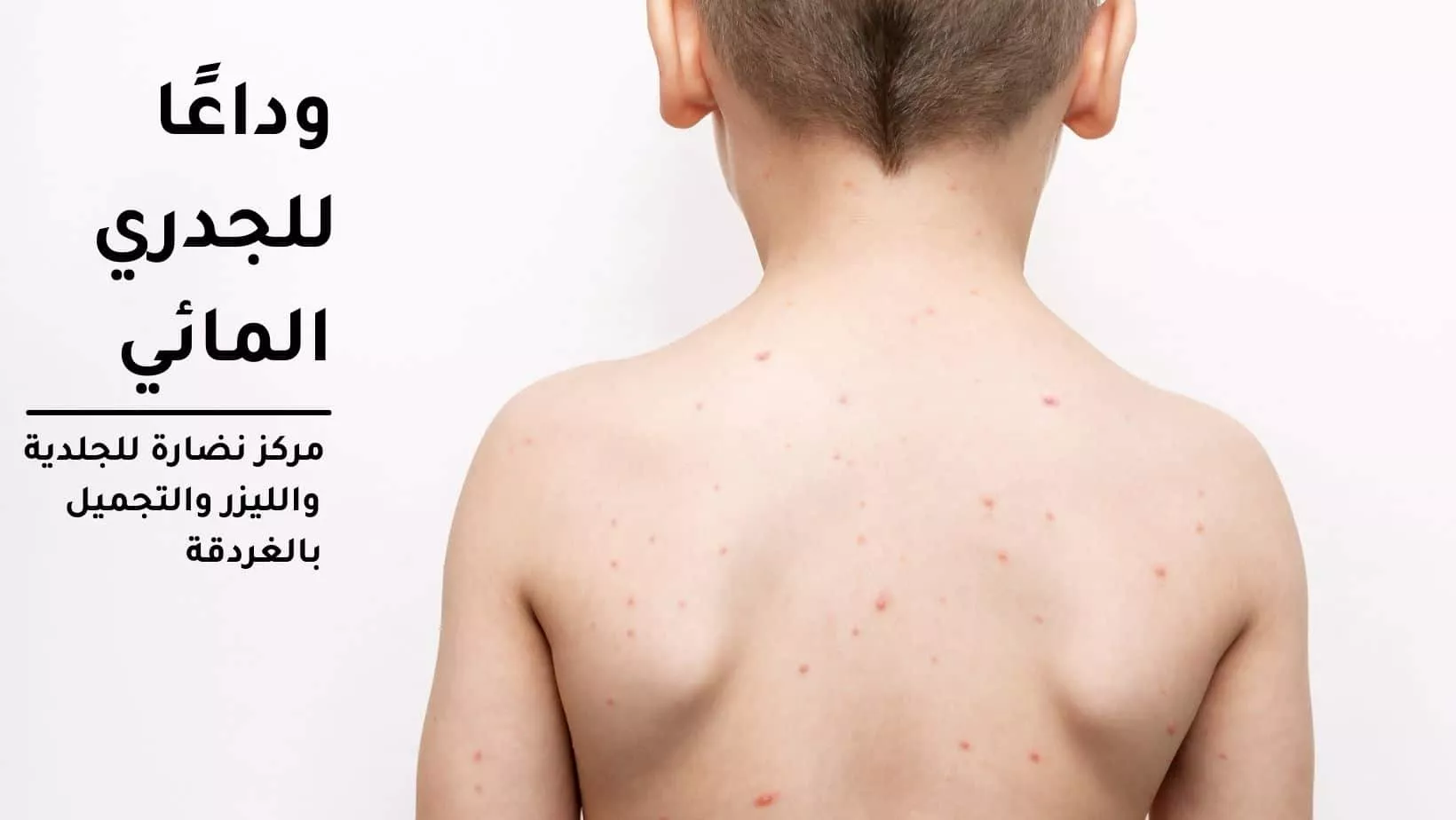Say goodbye to chickenpox with the dermatologists at Nudra Dermatology, Cosmetic and Laser Center in Hurghada.
Follow me, dear reader, to find out everything about people affected by it.
In this article, we will learn about the causes of signs of this disease, and what are its symptoms? And how can it be treated? As well as the various ways to prevent it.
What is chickenpox?
Chickenpox is a skin infection that mainly affects children, but adults can also get it.
Some warning signs of infection appear, the most important of which is a very itchy rash, with the appearance of some red blisters.
Over the course of several days, these blisters burst, then begin to ooze, crust over before finally healing.
Causes of chickenpox
Smallpox is caused by the Varicella Zoster Virus, which is a rapidly spreading virus.
You can get it by inhaling some of the particles that spread from chickenpox blisters or by coming into contact with objects on which the particles fall.
Contact with an infected person also contributes to the spread of infection.
Chickenpox is most contagious one to two days before the rash appears, until the blisters dry out and crust over.
Risk factors for chickenpox
Babies under the age of two, especially newborns under 4 weeks of age, are most susceptible, and about 90% young children develop it.
Older children and adults can also get it, but the risk may be increased if:
- If you have not received a virus infection before.
- If you have not received a special vaccination against this virus.
- Excessive mixing with children, whether in schools or child care places, and constant presence with them.
- During pregnancy.
You can also read : Foot cracks and methods of prevention.
Symptoms
Symptoms of chickenpox appear within 10 to 21 days after direct contact with an infected person.
But most people recover within as little as two weeks.
Signs of infection are generally mild, especially in children.
But in case of severe infection, the blisters can move to the nose, mouth, eyes, or even the genitals.
The first sign of infection is that you feel general tiredness, which is usually followed by the following symptoms:
- body aches.
- Fever.
- malaise
- Anorexia.
- Headache.
- Sore throat.
- Constant feeling of fatigue.
- Stomach pain, which may last for a day or two.
These symptoms appear in three stages and include the following:
The first stage
The patient develops raised blisters, or they may be pink, or red, which doctors call “papules.”
In severe infection, up to 250 to 500 of these blisters can appear all over the body.
The second phase
Over the next several days, the bumps turn into small, fluid-filled blisters called vesicles.
These vesicles last about a day before they appear or begin to leak.
Final stage
These open wounds crust over, then scale, and as they begin to heal, new bumps appear.
You may have bumps, crusts, and pimples at the same time.
Dermatologists at the Freshness Center for Dermatology, Cosmetic and Laser in Hurghada advise against mixing with infected people at this stage, as the virus can spread easily during that period.
Most cases of infection are mild and go away on their own, but contact your dermatologist at a freshness center right away if you develop any of the following symptoms:
- The rash spread and led to an eye infection.
- If the rash becomes very red, warm, or tender, this indicates a bacterial skin infection.
- dizziness;
- Hard breathing.
- persistent vomiting
- Movement stiffness.
- Fever higher than 102 F (38.8 C).
- You cannot control your muscles.
- Drought.
You can also read : Skin cancer and methods of detection.
Complications
Signs of danger appear more often in adults than in children, especially in people who have a compromised immune system due to cancer or HIV.
Certain skin disorders, such as eczema, may cause complications.
Once you've had chickenpox, the virus that causes the infection remains in nerve cells for many years.
This virus can reactivate again after a while and lead to shingles, a condition that causes painful blisters.
There is a vaccine for herpes zoster, and it is recommended by dermatologists at the Dermatology, Cosmetic and Laser Center in Hurghada for adults over 60 years old, but it is taken with extreme caution.
Some complications, although rare, include:
- Bacterial infections of the skin, blood, and soft tissues.
- Brain inflammation.
- Coagulation.
- Pneumonia.
- Liver problems.
How can chickenpox be diagnosed?
Signs of infection appear clearly on the skin and can be diagnosed through those blisters spread on the body.
Some medical tests can be done to confirm the infection.
You can also read : Pediatric Dermatology.
chickenpox treatment
The virus starts its course within 5 to 10 days, but if you have a severe rash, symptoms can last for a long time.
The dermatologists at the Freshness Center for Dermatology, Aesthetics and Laser in Hurghada recommend the following:
- Use acetaminophen (Tylenol) for pain and fever
If you or your child has a high fever, or any pain caused by chickenpox, this medicine is very effective.
It also contributes to relieving the pain associated with sores that appear on the skin or in the mouth.
This medicine is LIKELY SAFE for most people, including pregnant women and children over 2 months old.
You should avoid anti-inflammatory painkillers such as ibuprofen, as it increases the symptoms of infection.
Do not give children under 16 years of age aspirin, as this can lead to a serious complication called Reye's syndrome.
- Don't scratch the itch
Scratching the rash can cause scarring, but to prevent this from happening you can:
- Wear cotton clothes.
- Apply calamine lotion to the itchy spots.
- Use an antihistamine to relieve symptoms such as benadryl (Benadryl).
- Keep your body hydrated
Drink plenty of fluids to help your body get rid of the virus faster, and it also helps prevent dehydration.
You can drink water instead of sugary drinks or soda, especially if the injury is in the mouth.
Avoid hard, spicy or salty foods that cause mouth pain.
You can also read : Tine versicolor and its treatment.
Drug treatment for chickenpox
If you're exposed to someone who has chickenpox, but doesn't yet have symptoms, your doctor may give you an injection of a treatment called immune globulin.
The doctor may resort to this medication, which contributes to preventing the appearance of symptoms in the following cases:
- During pregnancy.
- smokers
- People taking high doses of steroid medicines or undergoing chemotherapy.
If you're at risk and already have symptoms, an antiviral treatment such as acyclovir (Citavig, Zovirax) may help.
You can take the first dose within 24 hours of the appearance of the rash, then you will take one tablet 5 times a day for 7 days.
Methods of prevention
Dermatologists at Nadara Skin, Cosmetic and Laser Center in Hurghada recommend immunizing children with the varicella zoster vaccine to prevent chickenpox, usually after the age of one year.
The second dose is given at 4 or 5 years of age for complete protection.
Vaccination is the best way to prevent infection, as studies have indicated that between 70 to 90% people who have received the vaccine are completely immune.
If a person who has had the vaccination becomes infected, symptoms will be very mild and only last a few days.
Adults who have not previously been infected should receive two doses of the vaccine at least four weeks apart.
But there are some cases that cannot get the vaccine, and they are in the following cases:
- If you had moderate to severe disease at the time of the vaccination.
- If you have had an allergic reaction to gelatin, the antibiotic neomycin, or a previous dose of the vaccine.
- People who have previously donated organs.
- People who have had a recent blood transfusion.
Finally, you can consult dermatologists at the Freshness Center for Dermatology, Cosmetic and Laser in Hurghada in case of chickenpox to get the right medication for your case.







